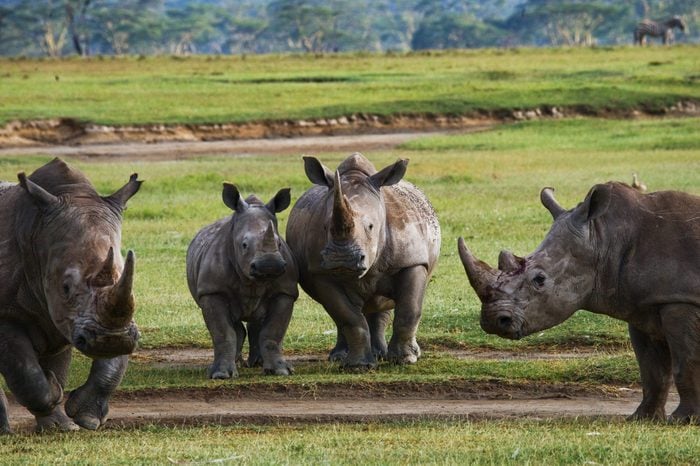
Around 500,000 rhinos once roamed free
According to the World Wildlife Fund, about 500,000 rhinos lived across Asia and Africa at the beginning of the 20th century. However, by 1970, just 70 years later, the rhino population dramatically dropped to as few as 70,000 worldwide. There were, and still are, five different species of rhinos, including the Javan rhino, the Sumatran rhino, the greater one-horned rhino, the black rhino, and the white rhino.
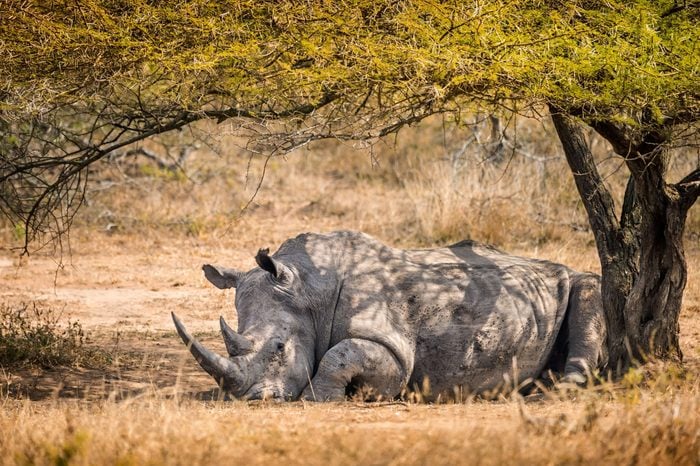
Less than 30,000 rhinos exist today
While there’s no exact number, experts believe that only 27,000 to 30,000 rhinos are still alive today. “Two species are African: the black rhino, with 5,500 animals left, and the white rhino, with [around] 18,000 animals left,” says Emma Pereira, Communications Manager at Save the Rhino International. “The other three species are from Asia: the greater one-horned rhinos, approximately 3,500; Javan rhinos, fewer than 70; and Sumatran rhinos, fewer than 80.”
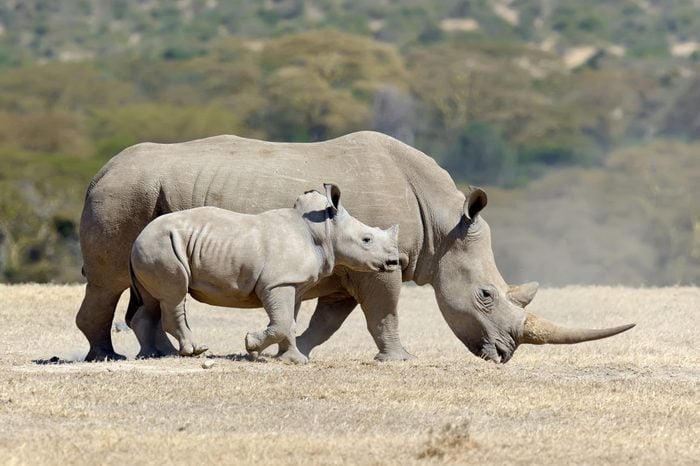
The white rhino
The white rhino currently makes up the largest part of the rhino population. Found in Africa, white rhinos have two genetically different subspecies: the northern white rhino and the southern white rhino. “Today, there are only two rhinos of the northern white rhino left, both of which are female,” says Bas Huijbregts, African Species Manager at the World Wildlife Fund. “They live in the Ol Pejeta Conservancy in Kenya and are protected round-the-clock by armed guards.”
The majority (98.8 percent) of the southern white rhinos exist in just four countries: South Africa, Namibia, Zimbabwe, and Kenya. “After more than a century of protection and management, they are now classified as Near Threatened, and 19,600 to 21,000 animals exist in protected areas and private game reserves,” adds Huijbregts. The white rhino is the only rhino species that is not considered endangered; instead, it’s Near Threatened. You won’t believe these other wild animal species you never knew were endangered.
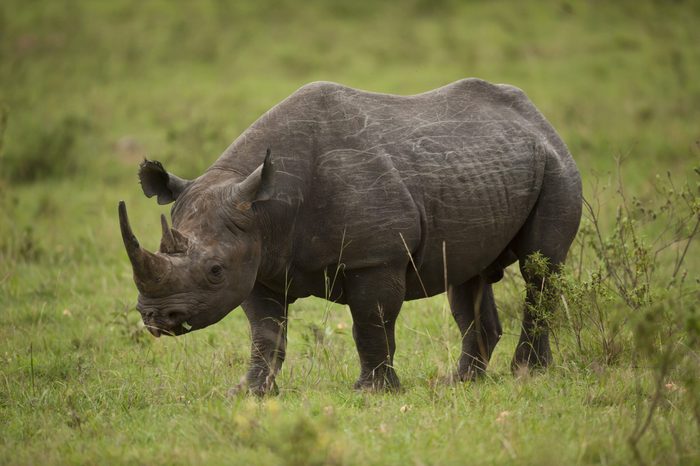
The black rhino
The black rhino is the second largest rhino species, hovering around 5,500, and has four different subspecies. Found in Africa, black rhinos live in grasslands, savannahs, and tropical bushlands. “Between 1960 and 1995, black rhino numbers dropped by a sobering 98 percent, from 65,000 to less than 2,500,” says Huijbregts. “While the black rhino is still classified as Critically Endangered, the species has made a tremendous comeback from the brink of extinction. Thanks to persistent conservation efforts across Africa, black rhino numbers have doubled from their historic low 20 years ago to between 5,042 and 5,455 today.”
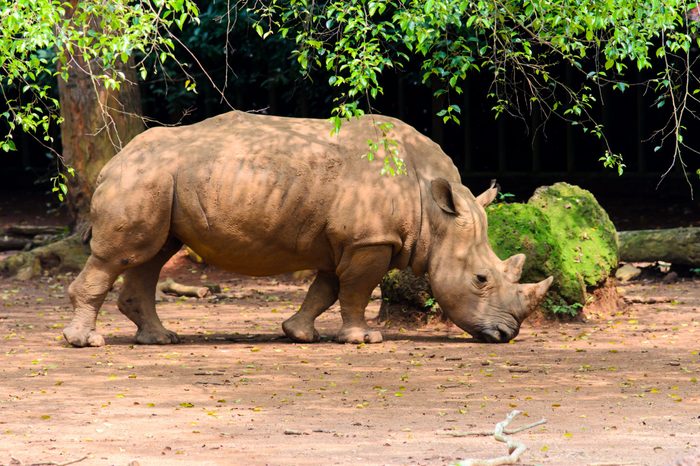
The Sumatran rhino
Experts list the Sumatran rhino as Critically Endangered, with fewer than 80 remaining in the world. Wild Sumatran rhinos live in Asia, primarily throughout the Indonesian islands of Borneo and Sumatra. Poaching and habitat loss has caused the Sumatran population to steeply decline. “The animals live in fragmented populations and suffer from low birth rates; it’s becoming difficult for them to find mates and reproduce,” says Huijbregts. “The species faces a crisis point. Without intervention, the Sumatran rhino will soon go extinct.” Rhinos in the wild are absolutely breathtaking.
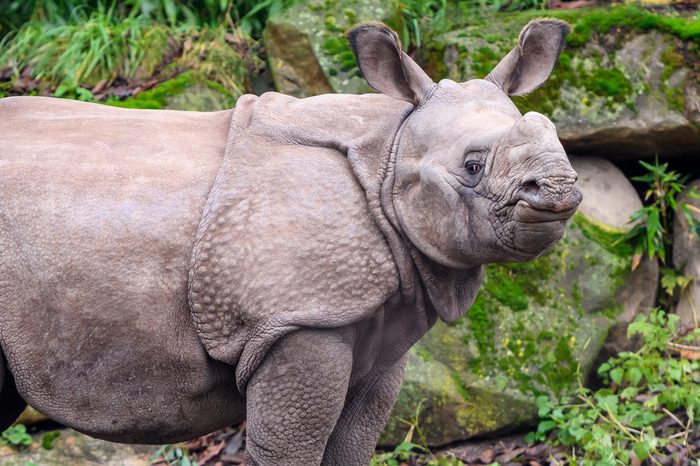
The Javan rhino
There are fewer than 70 Javan rhinos left in the world, and they all live in one place: Ujung Kulon National Park in Indonesia. Like the Sumatran rhino, the Javan rhino is considered Critically Endangered. “In 1965, there were fewer than 20 Javan rhinos left on earth,” says Huijbregts. “Successful conservation efforts have helped to recover a small portion of the population, but the species is still extremely vulnerable.” Unfortunately, the national park where every Javan rhino on earth lives is located on a volcanic arc known as the Sunda Arc. “The entire species could be lost in one catastrophic event such as a tsunami or an eruption of the nearby volcano Krakatoa,” explains Huijbregts.
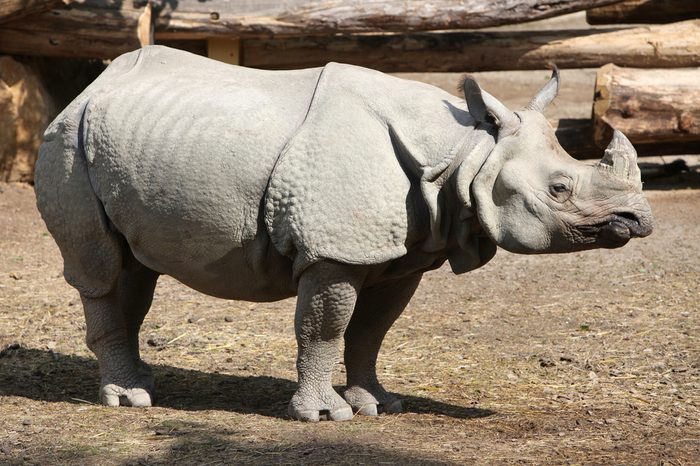
The greater one-horned rhino
The greater one-horned rhino, also known as the “Indian Rhino,” is classified as Vulnerable, with a population of around 3,500. They exist primarily in India and Nepal, and people almost hunted them into extinction. Once, only 200 remained, but it has made quite the comeback. “As greater one-horned rhino populations have grown steadily over the last two decades, the species’ remarkable recovery has been constrained by a lack of adequate habitat,” says Huijbregts. “Currently, 85 percent of all greater one-horned rhinos are concentrated in just two locations: Kaziranga National Park in Assam, India—which contains approximately 71 percent of the total population—and Chitwan National Park in Nepal, which is likely at or near its ecological carrying capacity for rhinos.”
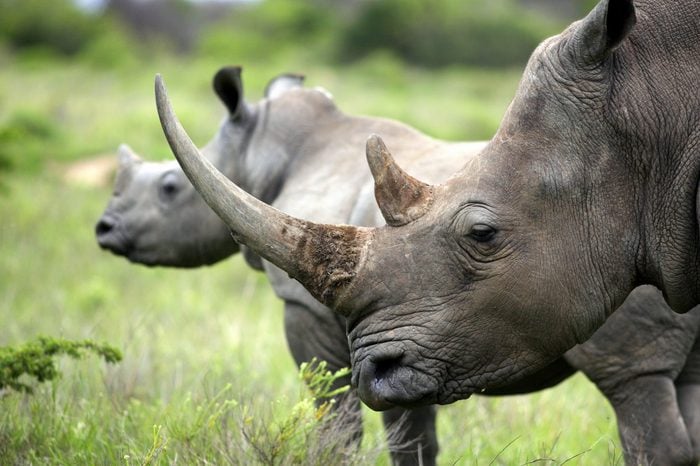
How many rhino species are extinct?
Technically, none. But since only two northern white rhinos are left, the species is “functionally extinct.” In other words, it’s very, very close to extinction. “Also, one of the black rhino subspecies, the West African black rhinoceros, has been recognized by the IUCN (International Union for Conservation of Nature) as extinct since 2008,” says Huijbregts. This black rhino subspecies was once found all over Central Africa, but “a 2008 survey of the animal’s last remaining habitat in northern Cameroon failed to find any sign of the rhinos,” he says. Plus, there are no known West African black rhinos in captivity. Unfortunately, it’s not just rhinos that face extinction. Check out these animals that have gone extinct in the last 100 years.
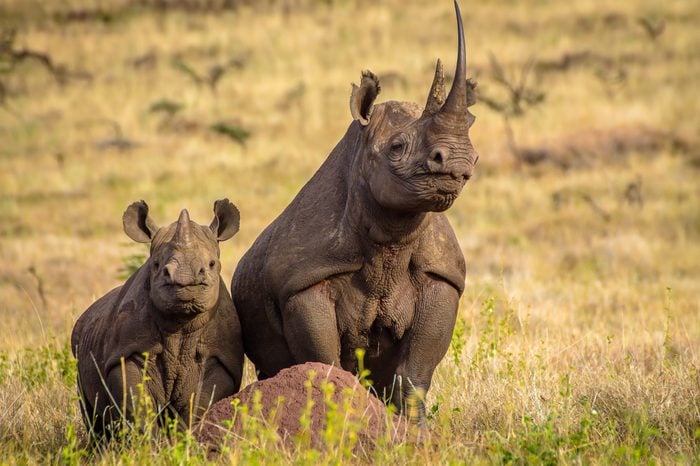
What has caused the rhino population to decline?
Experts say that poaching and habitat loss were, and still are, huge threats to the rhino population worldwide. “There were many more rhinos in the early 1900s, but today they are threatened by poaching and habitat loss,” says Pereira. Gavin Livingston, Source Population Alliance and Southern Black Rhino Program Manager at the Conservation Centers for Species Survival, adds that civil-war issues have also contributed to this problem in Africa.
Overall, humans are to blame—in a variety of ways. “As human populations increase, they are putting more pressure on rhino habitat as well, contracting the living space for rhinos and increasing the likelihood of contact with humans—often with fatal results,” explains Huijbregts.
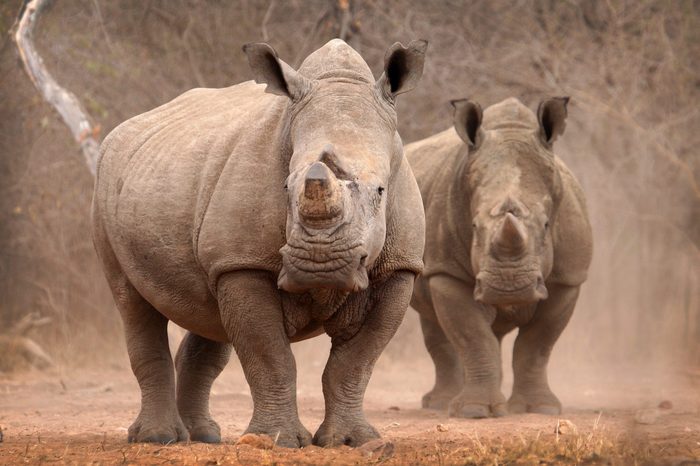
How are conservationists trying to save the rhinos?
There are many different efforts underway to stop rhinos from going extinct. According to Livingston, conservationists and assorted organizations are trying to prevent extinction by “preserving habitat, training and funding rangers and anti-poaching units, [and] creating sustainable insurance populations outside of the range countries.”
“To stop the killing, major efforts have been undertaken to ramp up protection efforts in their remaining sites,” says Huijbregts. “This is done through a wide suite of actions, including ranger trainings, better equipment, better coordination amongst law enforcement agencies, the use of modern technologies (forensics, DNA analysis, night-vision cameras, intelligence tools, etc.), and a focus on intelligence-led anti-poaching operations, as well as through better involvement and collaboration with local communities.” Did you know that these other beautiful animals could disappear in your lifetime?
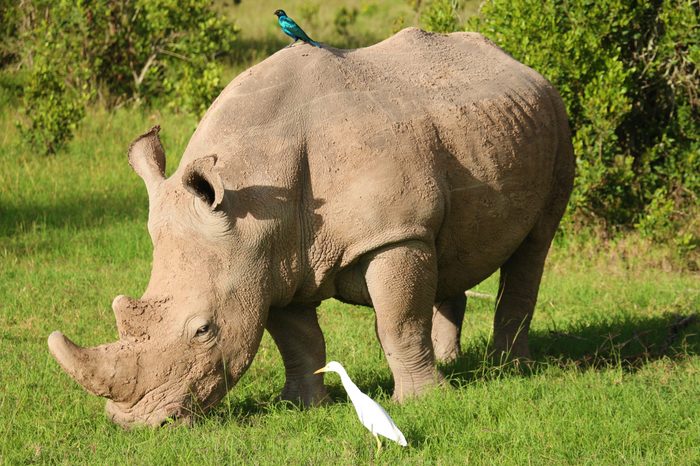
What does the future hold for rhinos?
“Unfortunately we can’t predict the future, but we remain optimistic,” says Pereira. “Poaching numbers are—slowly—decreasing, and there is more work taking place to encourage breeding for Sumatran rhinos and build their numbers.”
Still, Livingston cautions against complacency. “All rhinos currently exist in a guarded state, and Sumatran and Javan rhinos could easily go extinct in the next decade without further conservation work,” he explains. “Numbers of greater one-horned and white are slowly increasing, but so are the challenges they face.”
This is exactly how many cheetahs are left in the world.
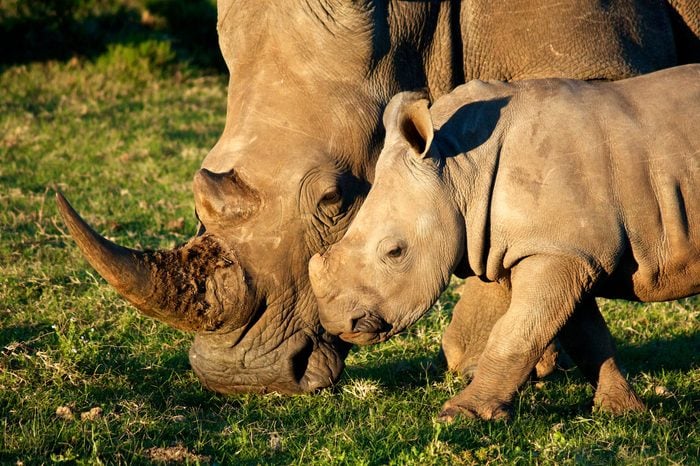
How you help save the rhinos
The biggest thing you can do to help save the rhinos? Don’t buy any products made from poached rhinos. Livingston also recommends supporting rhino-focused non-profits, zoos, and conservation breeding centers. Visiting the sites or simply donating money are both helpful. “We can also support international efforts to save their habitat, protect them where they live in the wild, and support innovative programs,” adds Huijbregts. The bottom line: There is hope, and every little bit of help makes an impact. Check out these 16 incredible animals that came back from the brink of extinction.